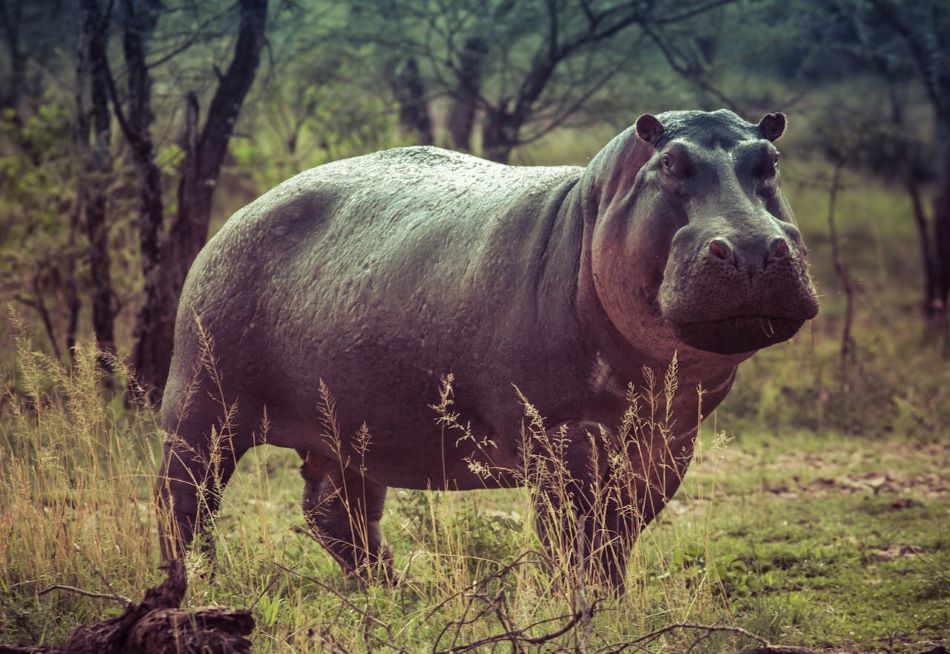When it comes to game hunting safaris in Africa, hippos often stand out as a prime target. These massive herbivores, known for their aggressive nature, are responsible for over 500 human fatalities each year, making them one of the most dangerous animals in the region. Given their formidable presence, it’s no surprise that hunters seek them out for the ultimate challenge.
However, the question arises: are hippos allowed to be hunted? The answer isn’t straightforward. While hippos are indeed hunted, the methods and regulations surrounding their hunting are complex. Factors such as conservation efforts, legal restrictions, and ethical considerations all play a role in determining whether hippo hunting is permitted. Understanding these nuances is essential for anyone considering a game hunting safari that includes these giant creatures.
[DYNAMIC-BLOGTABLEOFCONTENT]
Key Takeaways
- Regulations & Ethics: Hippo hunting is regulated and influenced by conservation, legal, and ethical considerations, varying significantly across different African countries.
- Historical Context: Hippos have been hunted for their meat, hides, and teeth for centuries, with modern regulations aimed at sustainable hunting practices.
- Ecological Impact: Responsible hippo hunting can help maintain ecological balance and support local economies through conservation funding.
- Human Safety: Regulated hunting can mitigate human-wildlife conflicts, reducing the risks posed by aggressive hippos.
- Alternatives: Wildlife photography safaris, game drives, and bird watching tours are ethical alternatives to hunting, offering rich wildlife experiences and promoting conservation.
Historical Context Of Hippo Hunting
Hippos have been hunted for centuries, with records showing they were a significant source of meat for African tribes. In ancient times, their hides and ivory-like teeth were also highly valued. Fast forward to the colonial era, European hunters ventured on African safaris, targeting hippos not just for their resources but also as prestigious trophies. This set the stage for modern hippo hunts, which continue to draw hunters from around the world.
During the 20th century, regulations began taking shape to control excessive hunting. In many African countries, hunting laws were implemented to ensure sustainable practices. For instance, certain regions imposed quotas on the number of hippos that could be hunted annually, while others designated protected areas where no hunting was allowed. Despite these regulations, illegal poaching remained an issue, threatening hippo populations.
In recent years, game hunting safaris have become more regulated. Hunters must obtain permits, and they are usually required to be accompanied by licensed guides. These measures aim to balance the hunting industry with conservation efforts, ensuring that hippos are not over-harvested. Moreover, sustainable hunting practices contribute to local economies through hunting fees and tourism, providing funding for conservation projects.
For those intrigued by the challenge of Africa big game hunts, hippos represent both danger and reward. Their aggressive nature, coupled with their elusive behavior in the water, makes hunting them a formidable task. However, it’s essential to understand and respect the regulations and ethical considerations surrounding hippo hunting. Always ensure you’re informed about the legalities and conservation status when planning hunting trips in Africa. For a more detailed overview of game hunting safaris and regulations, visit Game Hunting Safaris.
So, you’re dreaming about hunting the big game in Africa, huh? There’s nothing quite like the thrill and challenge that comes with Game Hunting Safaris. Whether you’re a seasoned hunter or a newbie, this guide will set you up with everything you need to know, from choosing the right African Hunting Safari Broker to packing for your adventure.
Legal Status In Different Countries
Africa’s home to some of the most sought-after big game animals on the planet. We’re talking lions, elephants, and, yes, hippos. The sheer diversity and scale of wildlife here make it a bucket-list destination for hunters worldwide. Plus, these safaris are about much more than just the hunt; they’re an immersion into the heart of Africa—its landscapes, cultures, and ecosystems.
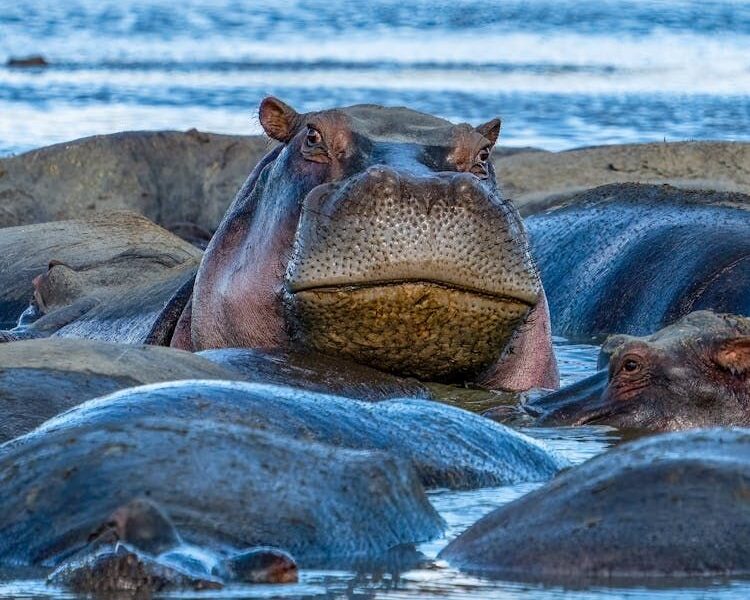
Planning Your African Hunt
Picking the Right African Hunting Safari Broker
First things first, you need a reliable broker. A good broker can mean the difference between a successful, thrilling expedition and a logistical nightmare. When selecting an African Hunting Safari Broker, check for:
- Reputation: Do they have verified reviews or testimonials?
- Licenses: Are they licensed to operate in the country you’re visiting?
- Experience: How long has the broker been in the business?
Not sure where to start? Game Hunting Safaris is a reputable broker that ticks all these boxes.
Selecting Your Game
African big game hunts offer numerous targets. Here are some of the top picks:
- Lion: The King of the Jungle isn’t easy to track but conquering one can be the pinnacle of your hunting career.
- Elephant: Known for their size and strength, elephants pose a unique challenge.
- Hippo: These hefty creatures are surprisingly elusive and aggressive. It’s no wonder hippo hunts are so popular.
Different countries have different regulations and seasons for each game, so doing your homework is crucial.
Tips For a Successful Safari
Gear Up Right
Packing the right gear can make or break your hunt. Here’s a quick checklist:
- Rifle and Ammunition: Make sure it’s appropriate for your chosen game.
- Clothing: Go for lightweight, breathable materials in earth tones.
- Optics: Binoculars and scopes are essential.
- Safety Gear: Think first aid kits, GPS devices, and insect repellent.
Know the Local Rules
Each country has unique wildlife laws. For instance, Tanzania requires hunting licenses and strict adherence to quotas, while South Africa offers more flexible options but also stringent anti-poaching regulations.
Stay Healthy
African climates can be brutal, and the last thing you want is to fall ill. Keep hydrated, wear sunscreen, and consider taking malaria prophylaxis if you’re headed to areas where the disease is prevalent.
Step-by-Step Hunting ProcessPre-Trip Planning
- Research: Identify your target game and the best time of year to hunt them.
- Licensing: Obtain all necessary permits and licenses.
- Booking: Secure your safari slot and accommodations.
On-Site Preparation
- Briefing: On arrival, you’ll get a briefing from your guide on safety, local wildlife habits, and the day’s plan.
- Calibration: Spend some time calibrating your rifle and other equipment.
The Hunt
- Tracking: Early mornings are usually best for tracking game.
- Stalking: Move quietly and maintain a low profile.
- Taking the Shot: Ensure you’re comfortable with your shot. A well-placed shot means a humane kill and less tracking.
- Tagging: Once your game is down, tag it immediately.
- Processing: Guides often assist with initial processing.
- Tribute: Many hunters like to pay tribute to the animal, reflecting on the hunt.
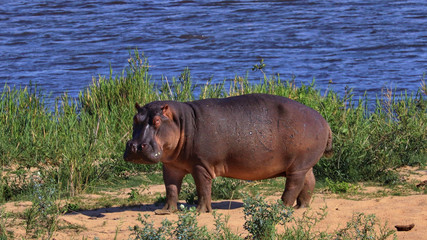
Insights & Tips
- Local Guides: Always listen to your local guides; their knowledge can be invaluable.
- Patience: The best hunts often require waiting and watching. Patience pays off.
- Conservation: Be aware of conservation issues. Many hunting fees contribute to local wildlife protection and community projects.
Packing Essentials
To maximize your experience, here’s a definitive packing list:
- Rifle and Ammo: Double-check airline regulations.
- Clothing: Layers for fluctuating temperatures.
- Footwear: Sturdy, broken-in boots.
- Accessories: Hats, gloves, and scarves.
- Communication: Satellite phone or radio.
- Documentation: Bring multiple copies of permits, IDs, and insurance.
Game Hunting Safaris offer an unparalleled experience. Venture into the wilderness, guided by experts, and hopefully, bag the trophy of a lifetime. For those who seek thrill and adventure, this could be your next big thing.
For more details and to plan your trip, visit Game Hunting Safaris.
Game hunting safaris in Africa offer an unparalleled blend of excitement, challenge, and natural beauty. For hunting enthusiasts, there’s nothing quite like the thrill of pursuing big game across the African plains. Whether you’re targeting majestic lions, elusive leopards, or formidable hippos, these experiences promise unforgettable memories. Let’s delve into the various aspects that make African hunt trips coveted by adventurers worldwide.
Reasons For Allowing Or Banning Hippo Hunting
Selecting A Reputable Broker
Finding a trustworthy African hunting safari broker is crucial. We can’t stress enough the importance of working with professionals. Check for certifications, memberships in hunting organizations, and positive client reviews. A reputable broker provides a seamless experience, ensuring every aspect of your trip is well-organized.
Choosing Your Game Targets
Africa’s diverse wildlife offers many game hunting options. Some popular targets include:
- Lions: Known for their strength and majesty, lions are a top choice for many hunters.
- Leopards: These elusive and cunning predators present a unique challenge.
- Elephants: Hunting the largest land animal requires skill and precision.
- Hippos: Despite their seemingly docile appearance, hippos are one of Africa’s most dangerous animals.
Each target requires specific skills and strategies, adding to the adventure’s appeal.
Packing Essential Gear
Preparing for a hunting trip involves more than just selecting the right weapons. Essential gear includes high-quality binoculars, durable hunting clothes, first-aid kits, and reliable GPS devices. Don’t forget to pack lightweight, moisture-wicking clothing for the hot African climate.
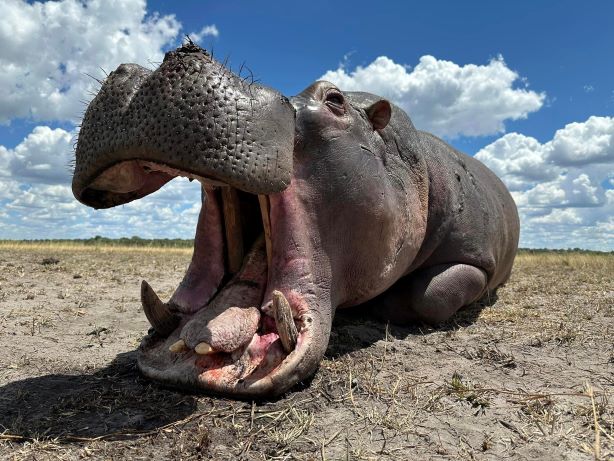
Understanding Local Rules And Regulations
Conservation Efforts
Understanding and respecting local conservation efforts is vital. Game hunting safaris often support wildlife conservation by funding anti-poaching initiatives and habitat preservation. Working with ethically-minded safari companies ensures your hunt aligns with these critical efforts.
Economic Factors
Game hunting is a significant contributor to the local economy. Hunting trips in Africa create jobs, support local businesses, and fund community projects. It’s essential to recognize and appreciate how your participation in these hunts benefits local communities.
Ethical Considerations
Hunting ethically involves following local laws, respecting the wildlife, and promoting sustainable practices. We must always remember the importance of hunting with integrity. This ensures that future generations can also enjoy the thrill and beauty of an African hunt.
Step-By-Step Hunting Process
Step 1: Pre-Trip Preparation
Before embarking on your hunt, thorough preparation is key. This includes selecting your preferred game, booking through a reputable broker, and ensuring all legal documentation is in place.
Step 2: Arrival And Orientation
Upon arrival, you’ll meet your guide and get an overview of the hunting area. Orientation sessions typically include safety briefings and quick refreshers on the local environment.
Step 3: The Hunt Begins
The actual hunt can span several days, depending on your targets. Patience and sharp observation skills are your best allies. Remember, the thrill lies in the pursuit.
Step 4: Post-Hunt Procedures
After a successful hunt, you’ll need to adhere to local regulations regarding game processing and trophy handling. Your broker should assist with these tasks, ensuring compliance with all legal requirements.
Insights & Tips For A Successful Safari
- Practice Makes Perfect: Regular practice at a shooting range enhances your accuracy.
- Stay Hydrated: African climates can be intense. Drink water frequently to stay healthy.
- Follow Your Guide’s Advice: Trust in the expertise of your guide. Their knowledge of the local terrain and wildlife is invaluable.
- Respect Wildlife: Always show respect for the animals and their habitats.
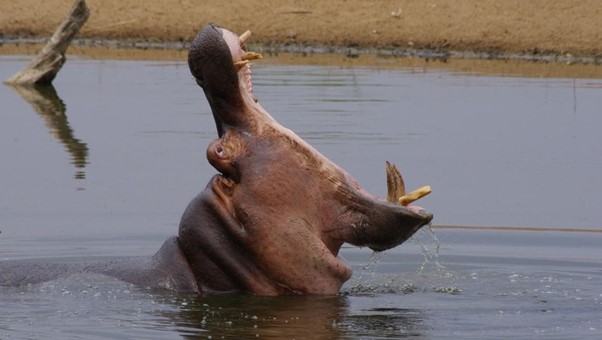
Impact Of Hippo Hunting On Ecosystems
Hippo hunting, particularly on African game hunting safaris, has various ecological impacts. Considering hippos play a pivotal role in their habitats, hunting can affect both positive and negative aspects.
Ecological Balance
Hippos serve as crucial ecosystem engineers. By moving between water and land, they facilitate nutrient cycling. Their droppings in rivers and lakes bring vital nutrients from terrestrial plants into aquatic systems. This activity supports fish populations, which in turn sustains local fishing industries and biodiversity. However, overhunting can diminish these natural processes, leading to nutrient imbalances and potential collapses in local fish populations.
Population Control
In some regions, controlled hunting of hippos addresses overpopulation issues. Hippo populations, if left unchecked, can lead to overgrazing. This can degrade riverbanks and surrounding vegetation. By regulating their numbers through legal hunts, we maintain vegetation balance and prevent habitat destruction.
Human-Wildlife Conflict
Hippos are among Africa’s most dangerous animals, contributing to significant human fatalities each year. Regulated hunting can help mitigate these conflicts. By decreasing hippo numbers in densely populated areas, we reduce the risks of fatal encounters. For local communities, this provides a sense of safety and reduces the economic losses from damaged crops and livestock.
Conservation Funding
Game hunting safaris often generate substantial revenue, a portion of which funds conservation efforts. Hunting permits and fees contribute to anti-poaching measures, habitat restoration, and wildlife research. Thus, responsible hunting can support broader conservation initiatives and help protect endangered species.
The Role of Game Hunting Safaris
Responsible game hunting safaris ensure that hunts are ethical and sustainable. African hunting safari brokers and organized hunting trips provide structured environments. These efforts ensure that hunts comply with local regulations and conservation goals. They also educate hunters about the ecological significance of their activities, promoting a culture of respect for wildlife.
Ethical Considerations
While some argue against any form of hunting, its role in conservation can’t be ignored. Ethical hunting involves targeting specific animals to aid in population management and ecosystem health. Moreover, ethical hunters follow strict guidelines to minimize suffering and maintain ecological integrity.
For more insight into hippo hunts and how they fit into broader conservation efforts, visit Game Hunting Safaris.
Understanding these impacts clarifies why regulated hippo hunting remains a complex but integral part of preserving Africa’s rich biodiversity.
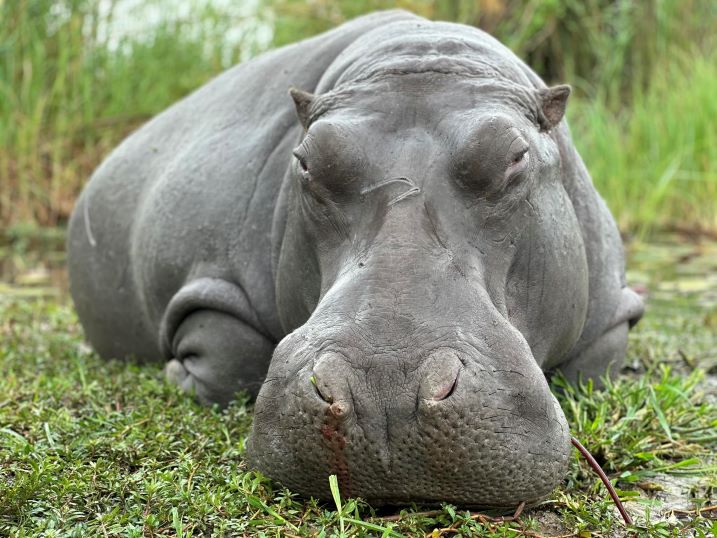
Alternatives To Hippo Hunting
For those looking for alternatives to hippo hunting, several exciting options offer rich experiences while promoting conservation and responsible game practices. These alternatives ensure involvement in wildlife encounters without the challenges of hippo hunting.
Wildlife Photography Safaris
Wildlife photography safaris provide an excellent way to capture the beauty of African wildlife without hunting. Participants can observe hippos and other animals in their natural habitats. Guided by experienced photographers, you’ll learn techniques for capturing stunning images. These trips often include visits to diverse ecosystems, increasing your chances of encountering various species.
Game Drives
Game drives offer a dynamic way to explore African landscapes and witness a range of wildlife. With professional guides leading the way, you can enjoy close-up views of animals like lions, elephants, and zebras. Game drives are customized to match interests, ensuring memorable experiences. Whether it’s a sunrise or night drive, the thrill of seeing wildlife up close is ever-present.
Bird Watching Tours
Bird watching tours cater to those keen on observing and documenting avian species. Africa is home to a myriad of bird species, making it an ideal destination for bird enthusiasts. These tours are led by knowledgeable ornithologists who can help identify various birds and provide insights into their behaviors. Since many bird habitats are near water sources, you might spot hippos and other animals along the way.
Eco-Trekking
Eco-trekking offers a combination of adventure and environmental stewardship. Hikers traverse through forests, savannahs, and mountains while learning about the ecosystem. Guided treks highlight local flora, fauna, and conservation efforts, creating an educational experience. This alternative attracts individuals interested in physical activity combined with nature exploration.
Volunteering for Conservation Projects
Volunteering in conservation projects allows direct involvement in preserving wildlife. Participants can work on projects focused on habitat restoration, wildlife research, and anti-poaching initiatives. Through these efforts, volunteers contribute to the long-term sustainability of species and ecosystems. The hands-on experience offers a profound connection to the natural world and a sense of accomplishment.
Fishing Safaris
Fishing safaris in Africa offer an exciting alternative to traditional hunting. Anglers can target various fish species like tigerfish and Nile perch in scenic waters. While primarily focused on fishing, these safaris often provide opportunities to observe wildlife along riverbanks and lakeshores. Experienced guides ensure safe and productive outings, making it a perfect activity for fishing enthusiasts.
Cultural Tours
Cultural tours immerse visitors in the traditions and lifestyles of local communities. These tours often include visits to villages, markets, and historical sites, providing a deeper understanding of regional cultures. Participants can engage with locals, learn about traditional crafts, and enjoy authentic cuisine. The tours foster appreciation for the cultural richness of Africa and help support the local economy.
For more information on planning your next adventure, visit Game Hunting Safaris.

Conclusion
Hippo hunting remains a complex issue with significant ecological and conservation implications. While regulated hunting can contribute to conservation funding and ecological balance, there are numerous alternatives that allow us to appreciate Africa’s wildlife responsibly. Wildlife photography safaris, game drives, and cultural tours not only offer incredible experiences but also support conservation efforts and local communities. By choosing these alternatives, we can enjoy Africa’s rich biodiversity and cultural heritage while playing a vital role in its preservation.
Frequently Asked Questions
What is the historical context of hippo hunting in Africa?
Hippo hunting in Africa has historical roots that date back centuries, with indigenous communities hunting for sustenance. In colonial times, it became a regulated sport. Understanding this history helps in framing current conservation efforts and regulations.
How does regulated hippo hunting contribute to conservation?
Regulated hippo hunting contributes by maintaining ecological balance and generating funds. These funds are crucial for conservation projects aimed at protecting diverse wildlife and their habitats.
What are the ecological impacts of hippo hunting?
Managed correctly, hippo hunting can regulate population numbers, preventing overgrazing and supporting ecosystem health. However, unregulated hunting can lead to population decline, disrupting the ecological balance.
What alternatives to hippo hunting are available for wildlife enthusiasts?
Alternatives include wildlife photography safaris, game drives, bird watching tours, eco-trekking, and volunteering for conservation. These activities offer immersive wildlife experiences without harming the animals.
How does wildlife photography safaris contribute to conservation?
Wildlife photography safaris promote conservation by raising awareness and appreciation for wildlife. Tourism revenue from these activities often supports local conservation initiatives and community development projects.
What is the role of volunteering in conservation projects?
Volunteering directly supports conservation efforts by providing manpower and expertise. Volunteers can help with research, animal care, habitat restoration, and education, making a tangible impact on conservation goals.
Are cultural tours a significant alternative to hippo hunting?
Yes, cultural tours provide enriching experiences that foster appreciation for local traditions and history. They support communities economically and can be integrated with eco-friendly tourism practices.
How does eco-trekking promote conservation efforts?
Eco-trekking promotes conservation by encouraging sustainable travel practices and awareness of natural environments. These adventures often include educational elements about local ecosystems and conservation challenges.
What benefits do bird watching tours offer over hippo hunting?
Bird watching tours provide non-invasive wildlife experiences and attract bird enthusiasts. These tours can be educational and contribute economically to conservation projects through sustainable tourism.
Is fishing safari a responsible alternative to hippo hunting?
Yes, fishing safaris offer a sustainable recreational activity that can be part of a broader conservation-focused tourism strategy. They typically adhere to catch-and-release practices to ensure ecological balance.
